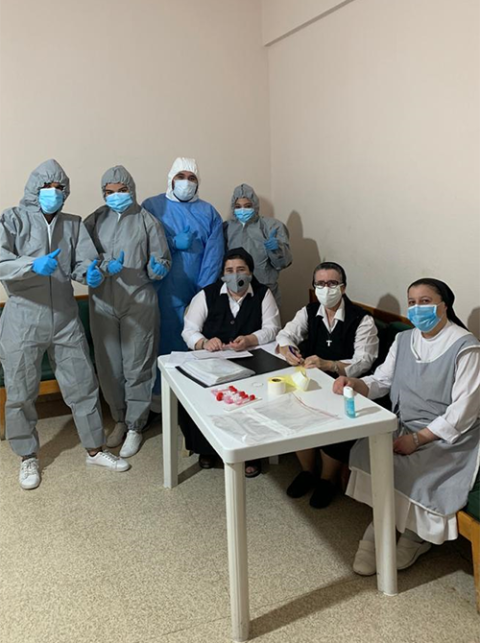
Sisters and staff of the Institute of the Sister Servants of the Heart of Jesus in Córdoba, Argentina, care for elderly sisters. Congregations around the world tried to protect their elderly and vulnerable members from the COVID-19 virus. (Courtesy of the International Union of Superiors General)
Editor's note: As part of our Coronavirus: A Year Later coverage, we invited leaders of women's congregational associations to reflect on how the pandemic has affected religious life in their regions. Some provided overviews; others focused on their individual congregations as emblematic of shared experience. This entry is from the International Union of Superiors General and is the last of this series. See all the columns here.

(NCR, GSR logo/Toni-Ann Ortiz)
Suddenly the world stopped. A very great silence covered the earth. The skies fell silent because planes were no longer flying; the streets were deserted. Life began to emerge from neighboring houses; families on the balconies, families in the patios. We felt that this silence was "pregnant" with something new. … Despite the many unknowns, the loss of loved ones, the complexity of the situation which may still develop in unknown ways, we have begun to see, with the eyes of faith the possibilities of a new hope emerging.
This "global standstill" was the first impact and it produced many different reactions. We experienced a certain bewilderment, because we did not know how to proceed, or where to place our energy.

The Antonine Sisters Congregation in Lebanon runs a Home of Mercy for 350 older adults who are physically or mentally disabled. Ninety percent of the sisters tested positive at different times; residents and employees also suffered. There were 31 deaths, including three elderly sisters. The sisters are thankful for help from organizations outside of Lebanon: the World Health Organization, UISG, and Antonine Sisters in the U.S. and Australia. (Courtesy UISG, Antonine Sisters of Lebanon)
Then we realized this obligatory stop calls us to reflect on what this means for the world and for our way of living. It calls us to allow ourselves to be shocked by the pain of people as we see unforgettable images that speak of the deaths and dying, and of health services on the verge of collapse. In many religious communities throughout the world, the sisters were infected with the coronavirus and sadly many died. In order to cope, they asked for help from sisters living in other parts of the world who came to nurse and care for those affected. Many sisters lost colleagues, family members, neighbors and people whom they knew through their ministries.
These many different experiences generate an interior suffering that produces many notes of sadness, especially when what happens around us touches us deeply; when we allow the reality to touch the core of our being. This calls us to suffer, to show solidarity, to raise questions about the essential things in life and to identify our deepest values and to evaluate our use of possessions.
It seems to us that religious life has begun to experience what it is truly called to be, not in some extraordinary or specific way, but simply by affirming the gift of life with the same sensitivity as that expressed by the majority of humanity. By participating in what is happening, we allow ourselves to be overwhelmed by fragmentation, by pain, by uncertainty and by perplexity. We have participated in a demanding discernment, trying to balance the obligation to observe the rules related to protection and safety, and the urgency to go out to provide care and help. This struggle puts us in contact with our weakness and fragility, thanks be to God. In the past we have been prevented from talking about our weaknesses ... yet our fears and death are very near.
Now we have been forced to change the rhythm of our lives, but we hope this change is irreversible. We don't want to return to the frenetic pace of the past, the overemphasis on "doing" rather than on "being." This pandemic time has taught us the importance of presence, of encounter and of witness in difficult times. At the beginning of the Year of Consecrated Life, Pope Francis reminded us that "it is precisely amid these uncertainties, which we share with so many of our contemporaries, that we are called to practice the virtue of hope, the fruit of our faith in the Lord of history, who continues to tell us: 'Be not afraid … for I am with you' (Jeremiah 1:8)." Now more than ever we are confronting profound personal and communal uncertainties which call us to be witnesses of that hope.
Sometimes we wonder where we would be today if this pandemic hadn't happened? How would all the sisters be? Would we have continued with the usual rush? We have had to become more realistic and to learn how to measure our capacity to accomplish our projects and our visions while also acknowledging our own frailties and indeed that of the whole of humanity.

A health awareness workshop, organized by a Sister of the Cross of Chavanod at the Women Development Centre, in Guwahati, in the state of Assam, India. Catholic sisters around the world conducted such informational workshops about COVID-19 for religious congregations, parishes and people in their local communities. (Courtesy of UISG)
Religious have always been available whenever needs arise. However, on this occasion in many parts of the world our freedom to respond was somewhat curtailed if sisters were not directly involved in what are considered frontline positions. While this was a suffering for many sisters, many found creative ways of reaching out through WhatsApp and the internet. Others were able to hold workshops to educate communities on how to cope with COVID-19, to demonstrate to children how to wash their hands carefully, to organize the distributed food or hold prayer services on the street. We could share thousands and thousands of experiences. … But, trying to share the testimonies of thousands of religious in an honest and humble way and in a few words, is very difficult.
The sense of brotherhood and sisterhood, of neighborliness, of closeness either face-to-face or virtually, invited religious to immediately embrace a new solidarity. We know that this is a partial viewpoint, but it would seem that we needed to be called to the edge, to overcome the borders created by institutional structures and by our fears in order to open us up to reach out to help in new ways, to collaborate with many organizations and to offer accompaniment ... because without this urgent crisis, it would not have happened so quickly.

Sisters of the Congregation of the Immaculate Conception in the town of Nilakottai in Tamil Nadu, India, help provide support for families in need. Around the world, sisters reached out to help those affected by the coronavirus pandemic. (Courtesy of Sisters of the Congregation of the Immaculate Conception)
In the midst of this difficult period of lockdown, many have been reflecting on this experience. This process of reflection is a reaction that is very intuitive because there are some common elements emerging in those reflections.
The first element is that what we are living is not something separated from the processes affecting the natural world and all of humanity. The second element is that our human vulnerability and that of our congregations which was already noticeable has now become even more prominent. The final element is a recognition of the change taking place. Two aspects of this change have been present for several years — first, a crisis about religious life and its meaning today, and second, a recognition that a paradigm shift is being born. The pandemic has provided us with new opportunities to recognize this change. We recognize that in the midst of the many voices reflecting on what we are experiencing, the voice that speaks to humanity with strength, authority and consolation is the voice of Pope Francis.
Advertisement
What has been the impact on religious life, as an organization or for the congregations belonging to your organization?
The impact is great: many apostolic works have been restricted and therefore activity is limited. Some centers are closed because they are no longer sustainable when their governments do not support faith-based institutions. We are referring to care centers for the sick, educational and informal education centers, and clinics that have not been able to provide medicines because the transportation of supplies has been affected. We ask ourselves whether the tests and vaccines will be available for all?
But there is another impact, which can be seen in the awakening of apostolic creativity and participation in many social processes of care and transformation. This positive impact places religious within society and the church in trying to mobilize initiatives for help and care. We can see the growth in inter-congregational collaboration and a growth in mutual support.

Since the start of the pandemic the Congregation of the Daughters of St. Dominic in the Philippines added ministry in which they cooked and packed lunch daily for the parish priest, assistants, seminarians, doctors, nurses and medical staff, guards, maintenance workers and checkpoint police officers, and those who beg for food. Hundreds of other women religious congregations also helped provide food for others during the pandemic. (Courtesy of UISG, Congregation of the Daughters of St. Dominic)
The impact for the church can be seen in the decrease in participation in the communal life of the parish: in sacramental celebrations and in meetings. Religious can become weavers within communities that are trying to reestablish and reconstruct themselves. The responses cannot be reduced just for opportunities to worship, but must respond to the actual needs because announcing of the word of God is best transmitted through concrete action.
Religious life seeks to be at the service of this communion as weavers of relationships and compassion.
What learning(s) have emerged in areas such as community, prayer, ministry, health or finances, or other?
We have learned that people are more valuable than structures and institutions. But we need patience to overcome this time of crisis in order to continue offering our life to the church and to fulfil our commitment to serving humanity, especially those who are most vulnerable.

Sisters continued to be active in ministries as they could, particularly those focusing on anti-human trafficking. This is a meeting of Talitha Kum, the worldwide network of sisters involved in anti-trafficking efforts, held by the Sisters of the Society of the Redemption in Fortaleza, Brazil. (Courtesy of UISG)
We have learned that God looks at the reality that we are enduring with compassion. With mercy and compassion, he looks for those most abandoned; nothing and no one is left out of his reach. Hope is an attitude of God. God teaches us that this hope is creative, it brings about change and the capacity for change. We have understood that our hope needs to be strengthened and made concrete. We cannot simply go on reflecting without giving answers to those who are suffering. Conversion invites us all to return to Jesus and to the Gospel.
The other learning is related to spirituality, to our relationship with God. It is central to our life. We have missed daily Eucharist and participating in liturgical celebrations. But we have rediscovered other ways to pray and worship, especially the beauty and strength of sharing the word of God in community and the possibility of sharing it online with many more people. We have discovered a world without borders thanks to worldwide connections; but we have also continued to listen to those who are closest and most in need and to share our resources with our neighbors.







